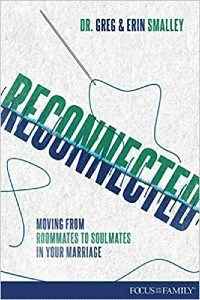Preview:
Woman #1: You know, we used to do things together. We’d go on walks; we’d have date nights. But somewhere along the way we just … stopped.
Man #1: My wife is so busy and we never time for just us. I miss her.
Woman #2: I wish my husband understood how I feel. I want him to be my soulmate.
End of Preview
John Fuller: Well, maybe you can relate with those comments. No one wants to feel lonely in their marriage, uh, but you might feel like there’s nothing you can do to change that. Today on Focus on the Family, we’ll be examining loneliness in marriage and ways that you and your spouse can work together towards greater connection and better intimacy. Your host is Focus president and author Jim Daly and I’m John Fuller.
Jim Daly: John, this is one of those unexpected, uh, gaps in a marriage that can occur, a problem that we don’t anticipate and, frankly, we’re kind of surprised when it happens, loneliness, and I think many men experience this. Uh, we’re going along thinking our marriage is great, everything’s fine, and, wham, we discover our wives are lonely and unhappy, and we may not even know why or how or what to do, how to respond, but the fact is, loneliness goes both ways. Uh, both husbands and wives can experience this. And a chilling statistic from Psychology Today magazine reveals that 63% of people who report feeling lonely are currently married and living with their spouse., so it’s a big problem and that’s why we’re tackling it today.
John: And we have our friends and colleagues back in the studio, Dr. Greg Smalley and his wife Erin. Uh, they lead our Marriage and Family Formation team here at Focus on the Family, and they’re speakers and writers and podcast hosts and, uh, they’ve written a lot of books together for husbands and wives and, today, uh, we’ll be talking about, uh, the one they wrote called Reconnected: Moving from Roommates to Soulmates in Your Marriage. And we have that here at the ministry, just call 800, the letter A and the word FAMILY, or stop by focusonthefamily.com/broadcast.
Jim: Greg and Erin, welcome back to Focus, as if you were only about 100 feet away (laughing).
Greg Smalley: The elevator ride took a while though.
John: Thanks for taking the effort, yeah.
Erin Smalley: Yes, yeah, I didn’t take the stairs, but … (laughing).
Jim: No, it’s good to have you here, as it always is. Let’s talk about the definition of loneliness ’cause, you know, spouses can feel lonely for a variety of reasons and sometimes it’s normal, right? I mean, people in marriage, you’re busy doing things, uh, raising the kids, let’s take that one, for example. You can feel somewhat lonely from your spouse because there’s so much on your plate, there are so many demands on you. At the end of the night, there’s just not a lot of room, uh, you know, to, uh, deal with that loneliness. So define loneliness and, and make sure that people understand what’s healthy and what’s unhealthy.
Erin: You know, Jim, it’s kind of just that emotional disconnect because we marry to have that deeper, heart-level connection. We don’t marry to have business meetings or to have conflict, although that happens. But, really, what’s part of that is not, feeling not listened to, um, their spouse isn’t talking to them, they’re not taking them seriously, or maybe they’re not even making eye contact, and so it really is looking at that there’s just this big emotional disconnect.
Greg: And I think there’s also a part of it that, that I realized, I mean, this was kind of a big insight in my own life and marriage, that some of the things that Erin and I do, certain activities like, you know, maybe one of us is cooking or the other’s doing the bills or someone’s taking care of the inside of the house, the outside of the house, that within those roles, it can be v-, a very, very lonely place. And so it’s not just that there’s an emotional disconnect, there can also be things, activities, behaviors, roles that we’re doing that we just feel like we have no support, we’re doing these completely on our own.
Jim: Well, and that leads to, I think, your first example, that something you learned during the pandemic here, you’re at home together all the time, everybody put your hand up (laughing), and, uh, you learned something about yourselves. What was it?
Greg: Yeah. So, at some point, uh, we had all of our adult kids, we had a full house, and, at some point, I think Erin, you got really frustrated, kind of sat us all down together.
Erin: Well, I got overwhelmed thinking about how am I going to cook three meals a day for all of these people?
Jim: Three meals a day?
Erin: Three, at least three meals a day.
Jim: Box of cereal, girl (laughing). Come on.
Erin: So I’ve got six people in my house, four of whom are adults, and going, “Okay, I can’t, I don’t want to do all this by myself. I don’t want the pressure.” I mean, I could’ve, but … I know many of friends did, but I was also still working and feeling, just feeling overwhelmed. And I said, I sat the family down, and I said, “Okay. How are you all going to contribute to the meals?”
Greg: Yeah, and it wasn’t that Erin doing the cooking was gender-based, “You’re the woman, you have to do the cooking.” She’s a phenomenal cook, so just, over the course of our marriage, she’s just so good at it, I wasn’t, so kind of you, you did that. But I remember going, “Okay. I’ll, let’s, the kids and I will talk this through,” and so being very spiritual, the spiritual leader, I cast lots (laughing) and lost, so I became the, the, the official cook within our family during COVID. And here’s what so stood out to me is that, during the day, so as I’m thinking about dinner, um, (laughing) I would, I would … like in the morning, I’d go to the freezer, open it up, I would start to rummage, you know, what meat is frozen? Okay, grab someone, and then I’d think about, “Now when do I have to set this out to, to thaw?” I would then start to worry about, “Do I have all the ingredients that I need? Man, I’m going to have to run to the store over lunchtime.” I just realized how often during the day I was fretting (laughing) about when to do this. And, and at, at some point, I think I was choosing between two recipes to cook like pork chops, so tonight was pork chop night. And so Erin comes into the kitchen and I, I tell her, I’m like, “Hey, help me figure this out. There’s like a really good like honey, you know, flavored one, there’s a spicy one. What do you think I should cook?” And her response to me was, “Eh, chef, you got this (laughing),” and kind of patted me on the-
Jim: No direction whatsoever.
Greg: Right. She kind of patted me on the behind, which I was okay with, and yet something about what she said was very irritating and I said to her, I said, “No, no, no, no, no, come on. I, I, I’m tired of making all these decisions (laughing). Come on, what, what should I do?” And she, again, went, “You, you got this. I trust you.”
Jim: She didn’t want to participate.
Greg: She’s like, “It’s going to be delicious.”
Erin: Well, I was fully enjoying watching him fret over it (laughing) because it’s what I had been doing for about 28 years of our marriage and just realizing that he was experiencing what I experienced. And, again, it’s not that we ever sat down and said, “Okay, Erin, you’re going to cook,” I just did because Greg really didn’t cook, and I know a lot of men do cook, but it was so fun to see him stepping into that role and I fully was embracing it.
Greg: Well, and, and so, as she stood there resisting giving me any sort of direction, it, it really was a true light bulb moment for me ’cause I, I, all of a sudden, I just went, “Wait a minute.” I’m like, “Is this what used to happen to you (laughing)? Like did, did you used to worry about cooking throughout the day?”
Jim: You asked that question (laughs)?
Greg: And, and she just smiled, gave me that Grinch-like-
Erin: I was just so thankful he asked that question.
Greg: … you know, smile. And, truly, Jim, at that moment, I, I just had this epiphany and I just went, “Wow,” that it, it, it dawned on me, in that moment, that, that Erin, for all these years that she had been cooking, had felt totally alone in that because, uh, it was our rule, if she cooked, then I cleaned. But I’m telling you, there was never a moment during the day that I would think, “Man, do I have enough soap?”
Jim: Cascade?
Greg: “Do I have Cascade (laughing)? Do I have enough dish soap? How will I scrape everything off?” I mean, it just, it, I never worried about that, and I didn’t realize, until that moment, that that was something that Erin had been dealing with really by herself. And that, that was that part of that loneliness that occurred to me that I had no idea that she had been bearing that burden by herself.
Jim: Sure. Well, I think that’s part of it and it’s an example, a great example, of how, uh, that loneliness develops. That statistic though, 63%, of married couples, someone in the marriage feels lonely. Uh, fill that in a little bit. You’re both counseling couples and, and talking to people. Um, what, in addition to, you know, somebody feeling isolated in decision-making, uh, which is kind of the example you’re talking about, fretting over, you know, how to take care of people, what are some other contributors to loneliness that you see in, in marriages today?
Erin: I would say one challenge that we face as a nation is the pace that we keep, the level of busyness that we keep, that often we’re distracted by many other things. Sometimes we are distracted because it’s not feeling safe in the marriage, so we look to other things to fulfill that need to be connected. So, often, it’s not even just the tasks that we’re feeling alone in, but it’s also just that heart level, that we’re feeling isolated, disconnected emotionally, and that is, that hurts so deeply within our human heart because we’re created to be connected.
Greg: ‘Cause it’s so easy for me to do for Erin. Like, literally, just maybe two days ago, one day ago, Erin and I were just laying in bed, we’re just talking, and, and one of the things that she said, and I haven’t asked if I can even share this (laughing).
Erin: I love these moments (laughing).
Jim: Let’s watch this. It should be fun (laughing).
Erin: Yeah, let’s see how this transpires.
John: We’ll see how connected you all feel.
Jim: Yeah, here we go.
Greg: She, she … one of the things that she said to me was that, “Man, it would really be good if you could just initiate asking me how I’m really doing,” and she goes, “I’m just not feeling connected with you.” And, instantly, my mind went, “Ah, I, I got up this morning. I put a load of laundry in. I got the dishes unloaded. I made the bed.”
Jim: You go, man.
Greg: I mean, I just started running through, in my mind, all the things that I was doing for her as a way to serve her, as a way to love her, thinking, “Certainly, (laughs) anybody could see how much I love you and how connected we are because I’m doing all these things,” and yet being with her, just … not doing, but, but just being with her and investigating what’s really going on in her inner life, that’s hard for me. It’s easier for me to do and be active and, and show her how I’m loving her than to be vulnerable and to take a moment and just sit, “How are you really doing?”, to know her because, often, (laughs) it requires then me to also share, ’cause that was another part of what, of what she said as we were laying in bed the other day, and she said, “Yeah, I want you to kind of pursue how I’m doing, but then I want you to tell me how you’re doing.” There’s something about that that’s just intimidating for me.
Jim: Can’t I just do the dishes (laughing)?
Greg: Right, seriously.
Jim: It sounds a lot easier (laughs).
Greg: So much easier.
Erin: Well, and please hear me, I love that you do the dishes. I mean, so much has changed since COVID. When Focus came back to work full-time in June, I was like, “Um, who’s going to do all the house chores now?” because that had become Greg’s thing and like-
Greg: She was going to call you.
Jim: I’m sorry, what’s the answer to that question?
Erin: Yeah, does Jim Daly, does Jim Daly not know you have responsibilities at home now? What am I going to do? But I love that he’s doing those things. I really-
Jim: I’m sorry, how did I get into this (laughing)?
Erin: Yeah.
Greg: It’s your fault really.
Erin: Yeah, Jim Daly, you became like a bad word in our house.
Jim: So many things are blamed on me.
Greg: I need to come back at work into the office is what she’s saying.
Erin: I know, yeah. Yes. But I love that you’re doing those things and it means the world to me that he does those things, but there’s also a part, uh, as you were saying, Greg, just that human … we’re human beings and to sit and to be with each other, to be present with each other, to truly know each other, is just key because, when we get married, when we walk down the aisle, we’re not walking down the aisle thinking, “Gosh, I can’t wait to have somebody to, you know, do my laundry or, (laughing) you know, do tasks for me,” but, really, what you’re thinking about is, “I want this connection for the rest of my life. I want a best friend for the rest of my life.” So what I was saying the other night is I had shared with Greg about a situation I was dealing with and so I was saying, “It would be so meaningful to me if you just would follow up and ask me like the next day, like, ‘Hey, how’s that going?'” So that’s what I was sharing.
Jim: Well, that’s pretty good direction (laughs).
Greg: It was, it was great direction, but what struck me is the thought of sitting down and having that deeper conversation, it, it requires vulnerability-
Jim: Right.
Greg: … and, and that’s what can throw me at times, that it’s easier for me to do and just to show her through these tasks and behaviors than it is just to, to be in that moment with her, totally open, being vulnerable, and, and that’s, that’s hard. That’s hard for me.
Jim: Well, and it touches on the, one of the themes that you cover in Reconnected, this idea of being careful not to become roommates and, and, in a way, that’s what you’re describing. If the relationship is just a bunch of what I do for yous, you know, we do the, I do the dishes, you do this, I do that, that is a roommate relationship. So how is marriage different from that roommate relationship so you’re not living in that kind of status?
Greg: Yeah. I think the beauty of marriage, many things are beautiful about marriage, but one of them is that, because we’re in this covenant, lifelong commitment to each other, that what, what that can do is that it can make us feel safe enough to really be truly known, to really be vulnerable, and because that’s hard. I’m just saying that that was a hard thought of going, okay, when we sit down like that, it really does require that. But the cool part within our marriage, because of that, the safety of our lifelong commitment to each other, that it can help us to really do that. And, you know, for me, this whole loneliness thing, uh, the, the, the challenge that I would encourage men and women, if they’re brave enough, is to, to go to your spouse,, ’cause then I, I followed up that day, that sort of epiphany, that Erin was bearing this, this cooking burden on her own, is to go to your spouse and say, “Where are places in our marriage that you do feel lonely?” And, and-
Jim: That’s a good question.
Greg: … and this is an ongoing thing because I did ask her that, so that’s like, what, six, seven months ago, but then the other night, as we’re just laying in bed and she’s revealing there’s another area that, that, “I feel alone, that when I share things, you don’t follow up. You, you’re not asking, pursuing, ‘How is that going?'” And so be brave, I mean, ’cause that’s a scary question. If you’re willing not to defend and to argue and to debate that, it gives you such an opportunity just to listen and, and try to understand what, what does that look like ’cause that, that … Erin would’ve answered, “I feel alone doing the, the cooking.”
Erin: Yeah, and the propensity, when you ask that question then, is to go into, “Well, let’s fix it and let’s get task-oriented. Well, if you feel lonely there, well, then I can do this, this, this, and this,” and, again, it turns to doing versus just really understanding, “What has that been like for you?”
John: Yeah.
Erin: And around the cooking, you know, we all, two of us, three of us, developed allergies when we moved to Colorado, so, “What was that like for you like then having to cook with all these dietary restrictions?” and, you know, on and on, “What did that feel like? What was the hardest part of it?” and just asking those open-ended questions of really trying to understand and just care and empathize, stepping into their shoes, “What has that been like?” before you get into “How do we fix this?”
Greg: ‘Cause it could be about the bills, it could be about outside maintenance, inside … it, it could be a number of things, but I guarantee you that every single married person has some area within that marriage where they feel alone.
Jim: Yeah, I feel lonely cleaning my garage-
Greg: I can tell.
Jim: … over and over and over again.
Erin: (laughs). Greg would come help you.
Greg: John Fuller should scoot up next to you (laughing) and [crosstalk].
John: I think we’ll just schedule a time for you talk to Greg [crosstalk].
Jim: No help with the garage (laughing).
John: Greg and Erin Smalley are our guests today on Focus on the Family with Jim Daly. I’m John Fuller and we’re talking about some of the content in their book Reconnected: Moving from Roommates to Soulmates in Your Marriage. Uh, get a copy, share it with a friend. Uh, this is really good stuff, and you can stop by focusonthefamily.com/broadcast or call 800, the letter A and the word FAMILY to get your copy.
Jim: Uh, I understand there was a point in your marriage where you, Greg, um, you were dealing with some depression, so, um, what was going on, what happened, and how did you, Erin, respond to it, if I could lay it all out there?
Greg: Yeah. My family had a, had a family ministry. My, my dad started it and my parents ran that and kind of within just trying to work together as a family, there’s some inherent challenges with that, and kind of within our family ministry, just there, there became some real challenges that, that I finally just decided, you know, “I want a, I want a vacation with my family. I want to, I want to hang out with my family during holidays and, and I, I don’t think that we can work together and do all that.” And so … but that became a very difficult decision. I was fretting about that. It just … the longer that that went on, it just kind of launched me into just a real season of depression. The problem is is that, you know, when, often when guys get depressed, that they, they tend to go into the cave-
Jim: Mm-hmm.
Greg: … and that’s exactly what I was doing. And so I would, I would go to work, I’d come home, and I’d, I may kiss you hello and pat the kids on the head, and I would wander up and just crash on the couch in front of the TV. And I didn’t want to interact with anybody, I didn’t want to talk to anybody, and, and it became such a lonely place, I know, for Erin, but, but also for me. I just didn’t know what to do. I didn’t know how to kind of manage and handle that level of depression and-
Jim: So what happened over time?
Greg: Yeah, I think Erin finally … I, I think you came to me in a very nice and loving, caring way and said, “This ain’t working for me (laughing). This thing, you coming home and disappearing, the, the kids miss you, I miss you. We got to figure this out. Like we need help here.”
Jim: Let, let me, let me get to a distinction. Uh, if you do that for a couple of days, that might be recharging your batteries.
Greg: Right.
Jim: So what length of time were you looking at here where it was (laughing) …
Erin: It was-
Jim: How many, how many years (laughing)? Um … I mean, it pr-, this, this probably [crosstalk] stretch on-
Erin: Months or years?
Greg: … to months-
Erin: Yeah, and I-
Greg: … weeks and months, yeah.
Jim: Okay. I mean, it’s good for definition ’cause sometimes you come home and you’re just fatigued, right, and you’re going to flip the news on-
Greg: Right.
Jim: … and channel surf or whatever-
Greg: Yeah.
Jim: … and you just, you’re re-energizing, but you’re talking about systemic-
Greg: Truly months.
Jim: Yeah.
Greg: I would just … I, I just, I didn’t have the desire to, to connect-
Jim: You disengaged.
Greg: … interact, totally disconnected.
Jim: Yeah.
Erin: And I don’t know that, in the middle of it, we knew that it was depression. I knew things were really hard, that he was struggling, I was struggling, and I can remember that day, just going to you and going, “Okay, what is going on?” He’s isolating off. The kids are … we had small kids at that point. They needed him. I needed him. And so it was really, uh, a lonely time, but I spent so much time in prayer and I remember my prayer just being, “Lord, we’ll stay here as long as you want us to stay here, but if you provide an opportunity, we will go.” And it wasn’t shortly after that that we ended up moving to Arkansas and it was … we just entered into a season of, of healing.
Greg: Yeah. But that, I, I had to get into counseling, and I don’t know if it was being a guy and, “I can solve this, I was a counselor (laughs) so why should I need this?” And really getting with a good Christian counselor, begin to challenge some things, help me to understand some things, really got to the root of what was going on, how I was feeling around just some of the family troubles that I was experiencing. And, and once I started to identify, okay, here’s the real issue, then I was able to deal with that and, and slowly, life kind of came back, color came back-
Jim: Yeah.
Greg: … to my life and, and we were able to deal with that. But that, uh, again, there can be many reasons why we feel lonely in a marriage. It can be that we’re just focused on all these tasks and feel alone that way or there’s something like a depression going on.
Jim: Sure, and you need to recognize those things.
Greg: Yeah.
Jim: Uh, Greg and Erin, there’s a distinction between sympathy and empathy, uh, and, you know, a spouse can feel sympathetic, but you, you believe that’s not the goal, empathy is where you need to move to. What’s the difference?
Greg: Well, when Erin shared what it was like for her over the many years of, of cooking, I could’ve instantly, you know, sympathized and gone, “Oh, yeah, that must have been rough. Man, that’s, that’s terrible. I bet that was hard,” but sympathy is when we feel bad for someone. So I could feel bad for her in that moment, but empathy is very different than that.
Erin: Empathy is actually stepping into, um, their shoes and, and feeling it with them, so what is it like to be them? What is it like … what would it be like for me if I had been carrying something that Greg felt completely alone with, what would that be like? Well, I would understand that, so, really, it’s entering in with them.
Greg: And she was able to, through that conversation, to go, “Well, you know how you felt over the past couple weeks, you know, where you fret and you’re asking this and that and, all day long, you’re worried about, uh, you know, ‘Will I be able to serve the, the gluten-free people and the dairy-free people (laughing)?'” She goes, “Do you remember what that was like? Like what was that like for you?” So she asked me that and so I was like, “Man, it’s just stressful and I’d fret all day long. Like I worry about this,” and then I was like, “Oh, that’s, that’s what it’s been like for you.”
Jim: See, I would’ve just done hot dogs (laughing), solve the problem.
John: Or cereal.
Jim: That would last like three days (laughing).
Greg: No, I wanted to get in, I wanted to try and, and to-
John: Yeah.
Greg: … to learn how to do this.
Erin: And you’ve become a phenomenal cook. He’s become a really great cook.
Jim: No, that’s good. I’m teasing.
Greg: So I’m inviting everybody over and I will cook for you a hot dog (laughing).
Jim: Yeah, gluten-free, meatless hot dog.
Erin: A gluten-free hot dog. Yes.
Greg: Dairy-free hot dog.
Jim: Thanks you. That sounds great. Uh, I got my fingers crossed. Uh, now, as we’re nearing the end here, uh, we’ve got to speak to the spiritual dimension of all of this. Uh, you know, the, the Lord tells us to bear each other’s burdens, He doesn’t say except in marriage-
Greg: Right.
Jim: … maybe especially in marriage, right, because our marriages are a reflection of what He wants for us in terms of creating us male and female and the two shall become one flesh, and the spiritual dimensions of that, it’s right there in His word. So at the end here, uh, speak to the idea of God’s hope for us and what He wants for us, which is good.
Greg: Yeah, I, I love that verse in Galatians 6:2, so bear one another’s burdens. And a burden is different than a load ’cause, earlier, it’s saying we should all carry our own load. Those are things like a backpack that we can carry around. A burden is like this humongous steamer trunk that you’re trying to carry that’s impossible. And so the word bear actually means to support or to remove and so, going all the way back to the whole cooking incidents through COVID, the question then became how could I best help bear that burden that Erin was feeling? Was I going to totally remove it or was it about supporting? Like it could’ve … to support her in that could’ve been, “Hey, when, when it’s time to cook in the evenings, we’re going to do this together. Like let’s just divide and conquer. Let’s be there and we’ll use it as a time to catch up and to talk and we’ll just make this into something we do together.” That could’ve been a great way to support, but, as we talked, I, I just felt, uh, a real just peace that, that I wanted to remove that from her, I, I … uh, you’ve done this for many, many years, and, and I want to do this now. And so that, that, that’s what I felt God calling me to do. But we’re not saying, “Hey, find out where your spouse feels most lonely is and now you do that.” It, it’s not about that. It’s saying what’s the best way to bear this burden with you? And it could be removing it or it could be really learning what does support look like through the midst of that?
Erin: And, you know, in scripture, it talks about those who marry will face many troubles and I often call on that verse because it’s true. We are all going to face troubles, but what I love about marriage is that you have a journeying buddy, that you have somebody with you, that you’re not facing those troubles alone. And I love what Greg is saying because, really, the goal is how do we support each other in our, our trials?
Jim: Yeah.
Erin: Sometimes it’s both of us going through it, sometimes it’s me or sometimes it’s Greg and, you know, the, the awesome thing that God did is He created this thing called marriage and that we get to walk through those things together.
Jim: Yeah. And it’s so hard, and I’ve said this many times because I have come to that conclusion that marriage is really set up for us to become more like Him-
Greg: Right.
Jim: … and that means selfless, uh, the Lord’s character toward us-
Greg: Right.
Jim: … loving, kind, selfless, and, uh, it’s hard because we’re selfish creatures. You know, that sin nature in us really drives us to go to our own benefit all the time and marriage is there to help us break that down and to become more holy and that’s an awesome journey, like you said, Erin. This has been so good. Thank you for being with us, and I just want to make sure people realize, uh, you know, what Greg and Erin are talking about are having those really good deep conversations where you can talk about what makes you lonely in our relationship. It’s, it, it’s a dare almost. Uh, maybe start there. Certainly pick up the book Reconnected. That’ll help. The chapters, uh, cover various areas of your marriage, but one of them is in this area of loneliness. And, uh, also we have great caring Christian counselors who would be willing to talk with you and identify with you some of those places where you may be struggling, you may be feeling lonely. Uh, we’re here for you, that’s the point. We’d also encourage you to pick up a copy of Greg and Erin’s book, um, in most ways, to help participate in ministry together. And, for a gift of any amount or a monthly gift, which is terrific-
John: Mm-hmm.
Jim: … uh, we’ll send you a copy of the book as our way of saying thank you for partnering with us in ministry.
John: Contact us today if we can help set up a time to talk to a counselor and, uh, you can donate as well. Our number is 800, the letter A and the word FAMILY, or stop by focusonthefamily.com/broadcast.
Jim: Greg and Erin, I can’t wait to, uh, talk with you again. Thanks for being with us.
Greg: Thank you for having us.
Erin: Yeah, thanks for having us.
John: And thank you for joining us for this episode of Focus on the Family. And, uh, coming up next time, Crystal Paine is going to remind us, as parents, to stop chasing perfection and, rather, to find God’s peace.
Preview:
Crystal Paine: But it’s because you can’t fail if you’re faithful because failure is not dependent upon your child’s choices or behavior. It’s about you walking with them.
End of Preview
John: On behalf of Jim Daly and the entire team, thanks for joining us today for Focus on the Family. I’m John Fuller inviting you back as we once again help you and your family thrive in Christ.





















